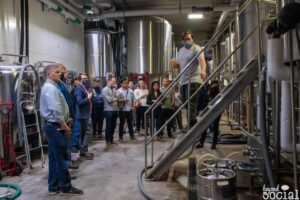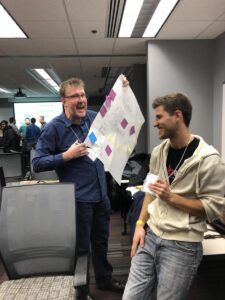
The startup ecosystem in Sioux Falls is in the strongest place it has been in the last decade. There are two successful accelerator programs that have multiple cohorts each year (Falls Fintech and Co-Starters). Zeal’s new startup mentor network has 28 volunteer entrepreneurial mentors. Falls Angel Fund has made more than $3 million in startup investments in the last five years. 1 Million Cups happens every week like clockwork and Startup Sioux Falls’ monthly startup events have had great attendance, despite the pandemic. Most importantly, there are many people engaging with the startup ecosystem for the first time exploring what it looks like to found and grow a business. Some of these people are participating in accelerator programs, while others are attending events, meeting with mentors, and engaging with startup ecosystem organizations. So, what’s next?
There are a handful of projects that supporters of the startup ecosystem could pursue to help more founders not only succeed with their startups, but also create new high-paying jobs in our community. While I am not speaking on behalf of any specific startup ecosystem organization, here are some ideas I would like to see happen in the next 1-3 years in Sioux Falls’ startup ecosystem.
Here are some ideas that I have:
- Establish a Pre-Seed Angel Investment Fund.
Outside of state proof-of-concept funding which does not apply to most businesses, there is no venture capital group willing to write the first check for $10,000 or $25,000 in risk capital. Businesses at this stage tend to be pre-revenue and pre-product-market-fit, which makes them difficult to evaluate. One solution would be to simply not try to evaluate them at all. Instead, a fund could be developed that would write a $10,000 check or $25,000 check to any high-growth company that plans on raising growth capital in the future. To do some basic filtering, the fund would only write checks to companies that have completed an accelerator program such as Falls Fintech or Co-Starters.
The fund would use a Simple Agreement for Future Equity (SAFE) mechanism, where the fund would only gain ownership in the company once they raise a priced equity round (such as a Series A). The SAFE documents would have to have a low valuation cap (probably $1-$2 million), a discount rate and pro-rata rights for the deals to make sense. This would be an incredibly high risk, incredibly high reward investment opportunity. There would also be standardized terms/pricing offered to every participating company. Using a SAFE as an investment vehicle would keep a fund from owning a small piece of failing companies that are not worth anything, while protecting ownership interests in companies that are doing well and plan on raising future funds.
To pull this off, there would need to be a handful of investors that believe in the concept and a venture capital firm or another servicing organization that could do the administration for the fund (paperwork, taxes, and distributions of funds). (Note: This post is not a solicitation to invest. It is just an idea!)
- Get Serious about Diversity, Equity and Inclusion
In the last year, the Sioux Falls business community has woken up to the reality that demographics are changing in our community and our community’s leadership circles do not always reflect the demographic make-up of our community. I am encouraged by many community DE&I initiatives, such as the Leaders of Tomorrow program, the Pathways program, and some initiatives in Forward Sioux Falls 2026. There is still a lot more to do and a long way to go for the business community to become more diverse and inclusive, but at least there are business leaders trying to do the right things.
In startup land, I would love to see immigrant entrepreneur cohorts, black entrepreneur cohorts and women entrepreneur cohorts that are modeled somewhat after Emerging Prairie’s efforts. These cohorts involve going through the Co-Starters curriculum, being paired with mentors, speaking at 1 Million Cups and participating in other training. That is just one idea though. I do not claim to have any answers to improve DE&I in our community and the first step in any DE&I effort should be reaching out to key leaders in diverse communities and asking them, “How can we help?”
- Bring Back Startup Weekend.

Startup Weekend is a 72-hour event that allows anyone that is interested the opportunity to build a startup over the course of a weekend. The event begins on Friday night by laying ground rules, generating ideas, and forming teams. The teams develop a minimum viable product over the course of the weekend and present to judges on Sunday nights. The winning team gets bragging rights and sometimes additional prizes to pursue their startup idea. While most Startup Weekend ideas don’t turn into real businesses, they give people the opportunity to be exposed to the startup community and what it takes to found a startup for the first time. The last startup weekend in Sioux Falls occurred in 2017 and it would be great to make it happen in Sioux Falls again.
- Offer More Curriculum-Based Education
The Sioux Falls startup community does a great job at putting on community events (such as Morning Marketing Parties, 1 Million Cups, pitch nights, etc.), but could do a better job of offering education and training to founders. Co-Starters is a great first step in this direction, but not every founder is ready for a full-on accelerator program. It would be great to get a monthly or bi-monthly speaker series that teaches specific aspects of founding a business (idea validation, developing a minimal viable product, intellectual property, team building, fundraising, marketing, scaling, etc.). This would be less of a “speaking from experience” series and more of a formal education offering that follows a curriculum.
There is definitely an education gap for founders on specific entrepreneurial topics, especially fundraising. Many founders do not understand the milestones they need to hit to raise money for their business, what reasonable terms are for an initial fundraising round, how they can find investors and what other resources (SBA loans, proof of concept funding, etc.) that they may be able to access. A periodic class on fundraising could help solve the knowledge gap that many founders have. Of course, there are many other topics that startup founders could benefit from learning about at a high level in addition to fundraising.
- Create Owned Media
One of the early wins that Startup Sioux Falls had before merging with the Zeal Center was that it had its own media. There was the Sioux Falls Startup Stories podcast hosted by Josh Sopko and the Startup Sioux Falls Facebook Live show hosted by Clint Brown. These two podcasts were great way to learn about members of the community and what founders and other creators are working on Sioux Falls. For a variety of reasons, these two shows are no longer being produced. We also had a freelance writer publishing original content on StartupSiouxFalls.com (which is still taking place, albeit at a slower pace).
Storytelling is a significant component of the startup ecosystem because it inspires future founders to consider entrepreneurship for the first time and creates awareness of what resources are available for those wanting to start businesses. Both the teams at SiouxFalls.Business and the Sioux Falls Business Journal do a great job of covering business openings and closures and other major business news. I think there’s room for a new podcast, longer magazine-style features and how-to content. I hear many of the same questions from founders over and over again and creating some long-form content that answers the most common questions that founders have could be a real value-add to the community.
- Start Promoting the Developer Community
High-growth companies that can create hundreds of high paying jobs in a community are almost always tech startups. While we should always work to support local small businesses, tech startups are what have the capability of moving the economic development needle. In the Sioux Falls community, there is a community of developers (SFDevs) but there is often not very much overlap between the tech community and the entrepreneurship community. I would love to see more founders participate in the developer community and attend their events and see more software developers participate in startup events. By creating more opportunities for business-minded and tech-minded people to interact, collisions will happen, and new startups will be born.
An easy first step to this end is for the startup community and developer community to start promoting each other’s events. A longer term goal would be to launch a code school similar to the Emerging Digital Academy in Fargo or AIM Code School in Omaha. This would give people that want to found tech startups, but lack basic programming skills, the opportunity to learn how to code and build out their software ideas. Another idea would be to create a funding mechanism specifically for software and tech startups, which might help motivate people that write software in the corporate world to take the entrepreneurial leap. This is another area where the right solution is not immediately apparently, but it is something the startup community should start working on.
Wrap Up
The goal of this blog post is to encourage startup founders, business leaders and ecosystem organizations to start thinking about “what’s next?” and “how can we help more founders succeed?”. We should not settle for doing what we have always done a little bit better than before. We should also never tell ourselves that “what we have is good for a community the size of Sioux Falls.” Our goal should be nothing less than building the strongest and most vibrant startup community in the Midwest and we should keep trying new ideas and iterating on them until that goal is fully realized. Hopefully, these ideas will spark thought, feedback and discussion about what we can do next to help startups thrive in our community.
